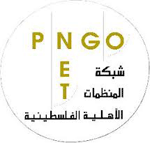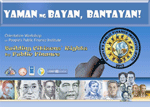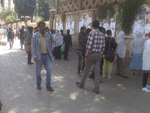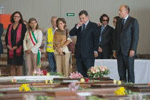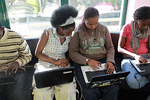Social Watch news
Published on Thu, 2013-11-07 11:06
The Palestinian Non-governmental Organizations Network PNGO raised concerns and warned of a dangerous deterioration in the humanitarian situation in the Gaza Strip due to severe drop-long power cuts caused by the fuel outage.
PNGO stated that power outage in the besieged Gaza Strip seriously affects basic life facilities in particular health , water, education and sanitation as well as vital sectors.
|
Published on Thu, 2013-10-31 13:05
Social Watch Philippines (SWP), Silliman University in Negros Oriental and Mindanao State University (MSU) in the Autonomous Region of Muslim Mindanao (ARMM) launched the People’s Public Finance Institute (PPFI), which is the first-ever center on teaching citizens to learn and be actively involved in public finance in the Philippines.
“As part of Social Watch Philippines’ commitment to asserting social development for people’s rights and empowerment, we are setting up PPFI centers in various State Colleges and Universities (SUCs) all over the country,” said former national treasurer and SWP lead convenor Leonor Magtolis Briones.“Through the Institute, SWP and SUCs will educate the general public, civil society organizations (CSOs) and interested local government officials on national and local public finance working under the framework of citizens’ participation,” she added.
|
Published on Mon, 2013-10-28 11:56
In the early morning of October 3 a tourist was enjoying the beautiful quiet beach of the Italian Mediterranean Island when three swimmers appeared. Three African young men frantically asked for help. They had left their mothers behind in a ship on sea that was on fire.
The ship had made the crossing that night and had reached the 800 perimeter of Lampedusa with over 500 passengers on board. While waiting to be able to offload the passengers, the ship was pushed away from the shore. When the captain tried to start the engine to bring his ship back into the perimeter, it didn’t work. He then decided to seek attention to get help by making a basket-fire. He burnt himself and threw the burning rod in the boat, rather than in the sea. The passengers on the boat panicked and rushed to one side. Inside the boat, in the cabins, women and children were asleep. Locked in the cabins, they would not survive the journey. Only six women made it alive.
|
Published on Mon, 2013-10-28 10:51
(Asmara 25 October) Members of Project Arbi Harnet (Freedom Friday) inside Eritrea have, this afternoon disclosed that fearing public discontent the Eritrean regime has ordered all Obituary notices of Lampedusa victims be taken off street notice boards in Asmara.
Following the accident on the 3rd of October, off the cost of Lampdusa that claimed the lives of over 350 Eritreans, Asmara residents had put up customary notices with pictures of victims and many people were gathering to read those notices and expressing their anger at the political and economic predicament that is pushing young Eritreans to take extreme measures to leave their country.
|
Published on Mon, 2013-10-28 10:08
The most important battles are generally the hardest fought. Such is the case of the financial transactions tax (FTT), a crucial element in the creation of a more just global financial system, which is facing renewed opposition from those who want to maintain the failed economic architecture of the past.
|
Published on Fri, 2013-10-25 08:51
More than 300 Eritrean refugees lost their lives last October 3 off the coast of the Italian island of Lampedusa. The survivors say that the Italian Navy could have prevented the deaths. The tragedy exposed the failings of the EU’s migration policies, and its failure to protect refugees - a legal obligation under International law.
This week there was a commemorative ceremony in Italy for those who died. The catholic priest Father Mussie Zerai and the journalist Meron Estefanos, founder of the International Commission on Eritrean Refugees witness the ceremony, and denounce it as a charade - a gimmick arranged for the convenience of politicians and an offense to the families of the victims.
Read the full statement of Father Zerai and Estefanos
|
Published on Wed, 2013-10-23 11:25
Radio Liberty discussed Azerbaijan’s place in the Open Budget Index (OBI) last week, as part of the “Joint Advocacy Platform” project, just on the eve of 2014 budget discussions in Parliament.
Kenan Aslanli, National Budget Group (NBG) member (and Social Watch member in Azerbaijan) and social and youth activist Bakhtiyar Hajiyev participated in the program.
|
Published on Mon, 2013-10-21 08:47
Twenty years after the 1993 World Conference on Human Rights and its Vienna Declaration and Programme of Action were adopted, more than 140 civil society representatives from around the world gathered at Vienna to commemorate the occasion. The 2013 conference, convened under the theme “Strengthening the Human Rights Movement Globally: Vienna +20,” was held in Vienna on June 26-27, and agreed on an Outcome Document that was presented by civil society at a High Level Conference on Vienna +20 hosted in the same city by the Austrian government.
|
Published on Thu, 2013-10-17 14:44
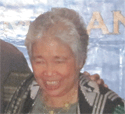
Prof. Leonor Briones
|
In the Philippines, Social Watch Philippines monitors the MDG programs as implemented by the government. Its main advocacy is more government spending for health, education, agriculture, the environment, and for social protection for all. It has organized the Alternative Budget Initiative (ABI) which proposes alternative budgets for these MDG-related expenditures.
|
Published on Wed, 2013-10-16 18:00
Huduma is an initiative of INFONET previously incubated at SODNET (Social Watch in Kenya), the United Nations Millennium Campaign and the African Institute for Health and Development (AIHD) that seeks to improve public service delivery through the strategic use of Technology.
The strategy is coined within a logic of improving the capability of the state and that of an informed citizen to collectively improve service. While the state remains the largest provider or guarantor of services, the citizenry have a right and responsibility to engage in the improvement of such services. Huduma places in the hands of citizens, simple technology and media based tools and platforms to amplify their voices, while at the same time, improves the capacity for better responsiveness.
|
SUSCRIBE TO OUR NEWSLETTER
Submit

|

